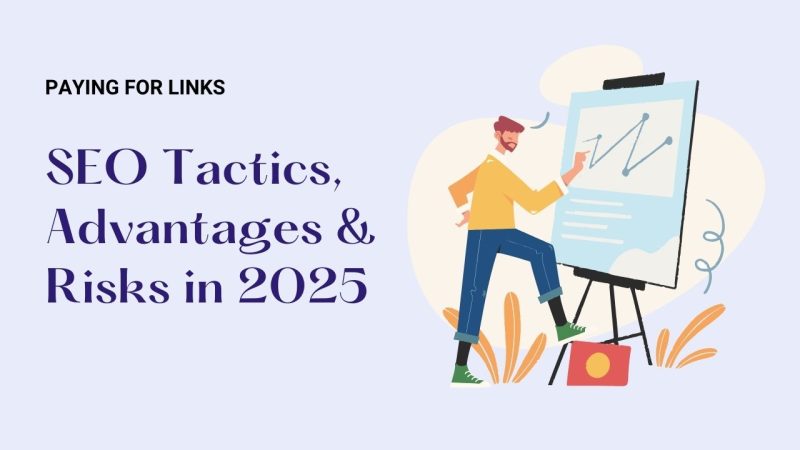SEO is still vital for many businesses, but it’s not the same as when it started. Just last year, Google changed its algorithms seven times. (source)
One key factor that helps SEO is backlinks, and having more of them is one of the ranking factors in Google’s books.
Paying for links is one of the options to get as many links as possible. So, should you buy backlinks in 2024?
Every SEO or website owner faces this question at some point!
Well, today in this article we will step with both feet onto this SEO landmine and answer this fundamental question.
Getting paid backlinks to improve a website’s rankings has always been a controversial topic. Some marketing experts see buying links as risky, on the other hand, you would see a lot of your competitors already doing it.
We are going to look at all the arguments for and against buying links. We will look at Google policies and then I will navigate you through the ethical conundrum to help you decide whether buying backlinks is a good idea or not.
What does Google have to say about buying links?
If you are somewhat of an experienced SEO and know where and how to look you can pay to get a link on virtually any website. And I am not just talking about the spammy low-quality content, rubbish blogs, and forum spam.
I am talking about the world’s highest tier most respected publications here. And what’s more, the prices they charge indicate that this is a significant revenue stream for them. We can assume that it is a fundamental part of their business model.
So is paid link building one of those hidden-in-plain-sight things?
If you are not buying links, are you the only one who is trying to win the race ethically and cleanly when everyone else is playing dirty?
Or if you do pay for links are you immediately becoming a criminal and everyone else is playing clean?
It’s no wonder that website owners and marketers are confused.
Now, let’s start with Google’s guidelines.
They do set the laws for what they consider to be acceptable in their search results. And the methods that website owners can use to influence those search results.

In their official document they say “If, however, a webmaster chooses to buy or sell links to manipulate search engine rankings, we reserve the right to protect the quality of our index. Buying or selling links that pass PageRank violates our webmaster guidelines.”
So this is pretty clear buying links are a NO.
And what’s more, they threaten to negatively impact a site’s search ranking. If there’s anything that scares website owners or SEOs is losing search rankings.
Google knows that by threatening a reduction in visibility, this makes people take notice.
But Google’s guidelines continue, “To stay within Google’s quality guidelines, paid links should be disclosed through a nofollow or other techniques such as doing a redirect through a page which is robots.txt’ed out.”
Google in one of their official documentation of spam policies goes on to say that “Google does understand that buying and selling links is a normal part of the economy of the web for advertising and sponsorship purposes. It’s not a violation of our policies to have such links as long as they are qualified with a rel=”nofollow” or rel=”sponsored” attribute value to the <a> tag. “

So they’re saying you can buy links if you use the rel=sponsored or rel=nofollow attribute. Show them the links you’ve bought so that they can ignore them for SEO.
This is like saying you can enter our bodybuilding contest if you take steroids so long as you wear a hat that says “I take steroids” so that we can disqualify you”.
That’s the line on Google’s website, well what about from Google’s human face of SEO, John Mueller?
In a webmaster’s office hours video in June 2021, someone asked John a very sensible question we want to get our website ranked, but since we see a lot of buzz around as to build links by paying, we are confused a bit.
Here John gives some advice on paid link building, he says “For example, if we recognize that a site is regularly selling links then we often go in and say okay, we will ignore all links on this website.”
Now two key phrases in what John said:-
- If we recognize…
- We often go in…
Both of them have caveats.
I would counter this and say that some of the world’s highest authority websites sell links and yet not all of their links are being ignored.
So either Google has trouble recognizing when a site is regularly selling paid links or ‘we often go in and ignore all the links from that website’ means that there are plenty of sites out there, selling lots of links. Google knows about the fact that they’re selling links and their links are not being ignored.
This is consideration number one which I think is with Google search systems.
by the way, at this point, you might be feeling more confused than ever. Don’t worry we have to examine the evidence before we come to any conclusion, so bear with me.
Will pay-to-link always exist?
Will paid link building ever actually die?
We might make a different decision if something is going to last forever than if something is going to be uncovered and found out soon.
This is an important question to pave our wave into the future of link building.
To answer this question, you have to look at a few things.
1. Some links are tough to build naturally.
Let’s say that you run an e-commerce store and you sell luxury fashion and you have a page on your store with Burberry bags. It is a product category page. You’ve got a bit of text on there like every other e-commerce store selling Burberry bags. And then you have got a list of products.
Supposing you want to rank that product category page against the whole bunch of other sites with Burberry bags, how are you going to do it?
Now of course the amount of content on the page is essential, and the authority of the site as a whole is important but at some point, you’re going to want to drive links to that category page.
So how do you do this?
This is an example of a link that is very difficult to build naturally. Because what is going to incentivize a high authority website to link through to an e-commerce product category page?
Yes, you could run a promotion with influencers but that’s often gonna be paid. You could write a piece of content about different trends with Burberry bags, or how to style your Burberry bags, etc. But that is altogether going to be an informational guide. That’s not going to rank for commercial terms like ‘Burberry bag’.
Also, you can build links to that other piece of informational content & then you can link it to your product category page. But what if you need to build links to that category page?
Sometimes you’ll be reviewing very high authority national news, and national magazine-type sites and you will see links to eCommerce product category pages. Well, how did they get there, how did the publications choose that specific category?
Is there a chance that the link was paid?
And the answer is Yes, there is a chance that the link was paid.
2. Ultra-high authority links
It’s possible to get very high authority links naturally. But you have very little control and essentially have no bargaining power with the publication whatsoever.
So you cannot be specific about what that link does or how it works.
when you see exact match anchor text links going to highly commercial pages on a very prominent website you think, how did they get that link? Is there a chance it was paid? Again, there is a chance it was paid.
3. Can Google detect paid links?
The final thing to consider in this question of will paid link building will ever die is, whether Google will ever be able to detect paid links.
And here’s what we need to go back to this rel=sponsored attribute. So back in the day, Google started clamping down on this idea of high-tier publications selling links. They issued some warnings that if we catch you doing this we might ignore links on your website and we might demote your site.
Some media properties panicked at this because their entire business was organic traffic. They could not afford to lose their visibility, as this could be the end of their business.
So in a way of being careful, they marked all outbound links from their website as nofollow. Meaning, these links should not pass any page rank.
For Google, this wasn’t particularly useful because having every single link marked to nofollow, they can’t tell what type of link that is.
So they brought out a new attribute called rel=sponsored and their guidelines are if you’ve paid for the link include the rel=sponsored attribute.
Now many in the SEO world don’t understand what this attribute does. And there is some speculation that the only thing it does is educate Google’s machine learning algorithms to identify what the commonalities are between all of these rel=sponsored links so that it goes out and guesses which other links might also have been sponsored.
But what if you don’t use one of these attributes can Google tell the relationship between the publisher and the website that’s being linked?
Well, John says in the same webmaster video from search engine office hours back in June 2021 “But where you’re actually kind of actively creating content that you know will attract links and then going out and reaching out to other sites and saying. Hey, we have this interesting content, don’t you want to take a look at it? And, kind of encouraging them to link to your site but without this kind of exchange of value, exchange of money, all of that.”
So what he’s saying reaching for links for your content is still the best way to attract links. But where there’s an exchange of value specifically in exchange of money, that’s where the line is crossed.
Now on the surface, that seems pretty clear cut but where things get muddier is what happens if as some SEOs suggest you pay a journalist for consulting and they happen to give you links?
What happens if you send your favorite journalist an iPad & they happen to give you links? What happens if you pull a family favor with someone you know and that journalist happens to give you links?
So potentially we end up in a really weird situation where Google is trying to decide what is fair and what isn’t. How can Google possibly arbitrate this, let alone build this into an algorithm and detect the relationship between every publisher and every website that’s being linked to?
Let’s get back to the original question that we were trying to answer Is paid links ever die? Well, in my opinion, it is unlikely. As long as links hold value for SEO and probably for some time after, people will be buying and selling links.
And Google will find it almost impossible to accurately detect what is a paid link and what isn’t.
So, Should You Buy Backlinks?
We’ve looked through Google’s take, and we’ve also looked at the kind of reality of the internet or SEO today. In my opinion, there’s absolutely no way you should buy the sort of low-quality spammy links that you see advertised on cheap websites.
If it’s very easy to buy a link, then it’s safe to assume it holds no value whatsoever. But for high authority sites, this is where you have to make the decision. This is a little bit like a bodybuilder choosing to take steroids or an influencer choosing to Photoshop their pictures before they upload them to Instagram.
A lot of this depends on your comfort level. For some businesses any potential risk even if it’s minuscule of something like Google levelling a penalty, or even just ignoring the links that are pointing at the site, the risk is so scary that they don’t even want to cross that line. Meanwhile, some people feel a kind of magnetic pull to the dark side in any situation. They will always choose to play dirty.
We have these two extremes where one is playing real dirty by buying only paid links and the other people are playing clean and never buying any sort of link. Most people sit somewhere in the middle. And this is ultimately a choice that you have to make.
Published by
Adam White
Adam White is a 20+ year SEO professional who has optimized over 400 websites, built and sold over 20 internet and SaaS businesses all with SEO as the main traffic source. Follow him on Twitter/X
All stories by Adam White


